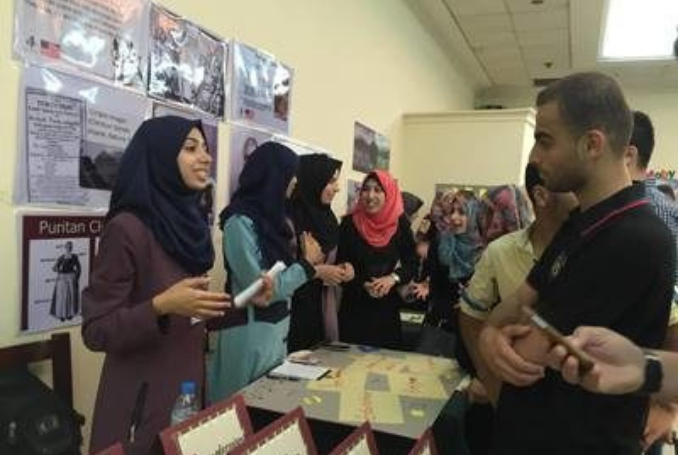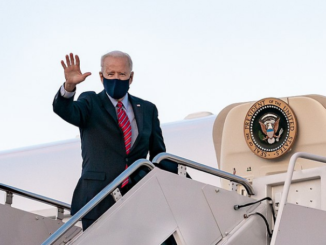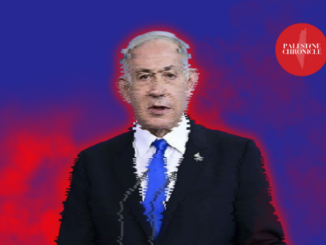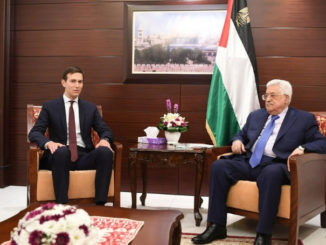
By Benay Blend
In the past few years, several articles and books have focused on the ties between Native American and Palestinian activists/scholars. See, for example, Steven Salaita’s ‘Internationalism: Decolonizing Native America and Palestine’ (2016), ‘Holy Land in Transit: Colonialism and the Quest for Canaan’ (2006), and Marion Kawas, “Solidarity Between Palestinians and Indigenous Activists Has Keep Roots” (2020).
Louise Erdrich does not draw these links in her most recent novel ‘The Sentence’ (2021), but it nevertheless brings to mind several commonalities as well as differences between the Palestinian solidarity movement and various forms of Native activism. Moreover, Erdrich highlights those moments in 2021 that called for alliances between various movements for social justice, including climate change and the murder of unarmed black men by local police, in particular George Floyd, so it makes sense to look for lessons regarding the Palestine solidarity movement that could be taken from the book.
Erdrich’s novel revolves around a fictional bookstore that is drawn from her own Birchbark Books, located in Minneapolis, Minnesota. Quoting from its webpage, Erdrich’s store “is operated by a spirited collection of people who believe in the power of good writing, the beauty of handmade art, the strength of Native culture, and the importance of small and intimate bookstores.”
Her description provides an outline for the book, focusing as it does on the booksellers who tend the store. At the center is Tookie, a Chippewa woman, during whose time in prison learned, the transformative power of written words.
Oral history, too, told by Tookie’s husband Pollux in the form of stories, plays just as important a role as the written word in this novel. It relates, in particular, to the many layers of the local landscape which had been colonized over and over again by generations of invaders.
For Palestinians, too, literature plays an important role. In “We Do Exist: Why the Palestinian Voice Should Take Centre Stage,” journalist/activist Ramzy Baroud explains why it is important to “reclaim the narrative” that counters Israeli propaganda. “Indeed, for Palestine to be free,” he concludes, “for the Palestinian people to achieve their full rights and for the Right of Return for Palestinian refugees to be honored, the story of Palestine has to be told by the Palestinians themselves.”
In ‘A Map of Absence: An Anthology of Palestinian Writing on the Nakba’ (2019), Atef Alshaer presents a body of poetry that by its very presence contests the Israeli claim that Palestinians do not exist. In poems such as Dareen Tatour’s “Resist My People, Resist Them” (pp. 224-226), there is a clear message that Palestinians will never be erased from their land.
Booksellers at Erdrich’s fictional store, as well as her real one, have varied reasons for being devoted to a profession that pays very little, sometimes demands long hours, but makes up for all that by allowing the staff to be surrounded on a daily basis with what they love, books that in different ways tell their story. Erdrich also pays attention to the loyal customers who come to buy the books, and their many reasons, mostly well-meaning, for doing so.
All except for Flora, who is what Tookie calls a “wannabe Indian” (p. 36), to be exact, a person who claims dubious Native heritage in order to appropriate their customs. Indeed, she is one of Tookie’s “most annoying customers” (p. 32), made more so by dying on All Souls Day, 2019, after which she returns to haunt the store. “A stalker of all things Indigenous,” Flora is a person “proud of having identified with an underdog and wants some affirmation from an actual Indigenous person” (p. 36) that she deserves the praise that she feels her due.
Palestinians are also subject to cultural appropriation by Israelis who claim parts of their culture as their own. As Ben White observes, Israel’s “Obsession with Hummus is About More Than Stealing Their Food.” Their land, their homes, their cuisine, their naming process for streets, cities and landmarks—all of this and more have been up for grabs.
“This is the context for the so-called “hummus wars,” explains White, that “is not about petty claims and counterclaims, rather, the story is one of colonial, cultural appropriation and resistance to those attempts.” In this way, Israeli ownership of what is rightfully Palestinian cuisine connects the former to the landscape while erasing the latter from the scene.
What distinguishes the former from the latter, though, is that, unlike “wannabe Indians” in the States, Israelis have no desire to claim Palestinian heritage. In fact, it is just the opposite, they are terrified of Palestinians becoming the majority population, so have gone to great lengths to erase them by any means possible: ethnic cleansing, revision of historical facts that allow them to claim that Palestine never existed, and laws that give Palestinians very few rights if at all.
Nevertheless, what both Palestinians and Native Americans have in common are “white saviors,” not all that removed from wannabes, who attempt to dictate what strategies exploited groups should use. As Midwestern librarian, writer, and activist Annie Windholz writes, “white saviorism” occurs when people of the dominant culture attempt to rescue oppressed others from their situation, usually without first listening to what they have to say. For example, Windholz uses the Dakota Access Pipeline protests, in which Native activists spoke for themselves instead of having other groups speak for them, but then those other groups, predominantly environmental organizations who do not have a good history of listening to people of color, jumped in to claim solidarity in order to get credit for themselves.
“We see this also on the larger scale outside of America,” writes Windholz, where those who are being helped are rarely consulted as to their needs. Indeed, as Ramzy Baroud observes, in “the violence debate,” the “non-violence bandwagon,” composed of liberals, progressive and progressive media, certain Palestinians for whom the term is useful, and others—all speak from their own belief systems and experiences, In the process, they ignore Palestinian voices and overlook facts that are on the ground.
As the late Black/Pan-African activist Kwame Ture/Stokely Carmichael observed: “In order for nonviolence to work, your opponent must have a conscience. The United States has none.” This statement accounts, too, for the fact that Native Americans, in Tookie’s words, are the “most oversentenced people currently imprisoned” (32). Her own sentence amounted to 60 years, lessened thanks to diligence on the part of her lawyer as well as her future husband.
It was in prison that Tookie learned about the power of literature, an experience shared with Palestinian prisoners, who are often detained with no charges for long periods of time. The motive for excessive imprisonment in both cases is to break the spirit of Native and Palestinian resistance, an effort that has always proved futile.
In the foreword to Ramzy Baroud’s These Chains Will Be Broken: Palestinian Stories of Struggle and Defiance in Israeli Prisons (2020), Khalida Jarrar explains that “prison is comrades—sisters and brothers who, with time, grow closer to you than your own family. It is common agony, pain, sadness and, despite everything, also joy at times” (p. XVII).
Jarrar understands, like Tookie, the ways that prison can serve as an educational foundation for its inmates who are trapped inside. While Tookie devours the books that a former teacher sends her while in prison, Jarrar writes in a letter smuggled out of prison, to be read at the Palestine Writes Festival in 2020, that “books constitute the foundation of life in prison.” The challenge she says, for her and fellow prisoners, becomes how to “transform our detention into a state of a ‘cultural revolution’ through reading, education and literary discussions.” She continues:
“Although physically we are held captive behind fences and bars,” Jarrar writes, our souls remain free and are soaring in the skies of Palestine and the world.” Attesting to the community of imprisoned women that is tied, too, to world-wide liberation struggles, she adds that “we work to establish and consolidate human values and strive to obtain social and economic liberation that bind the free people of the world together.”
The characters in Louise Erdrich’s novel share with Khalida Jarrar not only the recognition of the transformative power of the written word but also the ways that literature crosses borders in ways that unite people in a common anti-colonial struggle.
– Benay Blend earned her doctorate in American Studies from the University of New Mexico. Her scholarly works include Douglas Vakoch and Sam Mickey, Eds. (2017), “’Neither Homeland Nor Exile are Words’: ‘Situated Knowledge’ in the Works of Palestinian and Native American Writers”. She contributed this article to The Palestine Chronicle.

– Benay Blend earned her doctorate in American Studies from the University of New Mexico. Her scholarly works include Douglas Vakoch and Sam Mickey, Eds. (2017), “’Neither Homeland Nor Exile are Words’: ‘Situated Knowledge’ in the Works of Palestinian and Native American Writers”. She contributed this article to The Palestine Chronicle.







